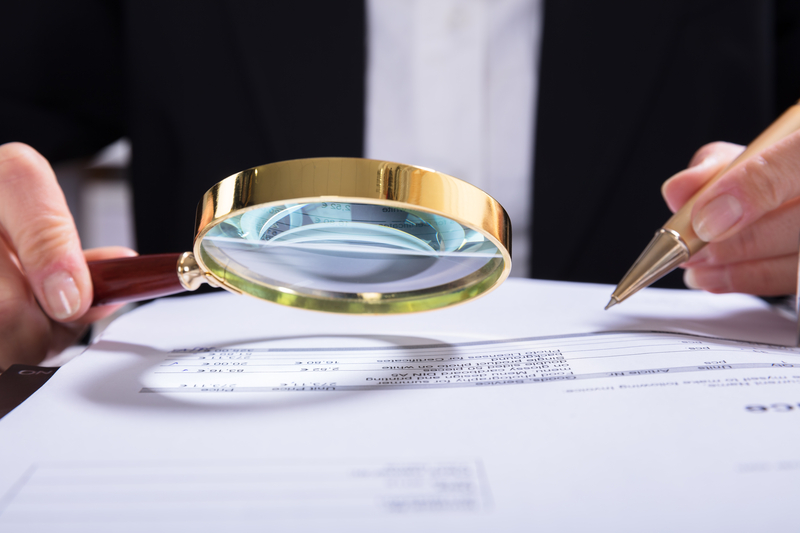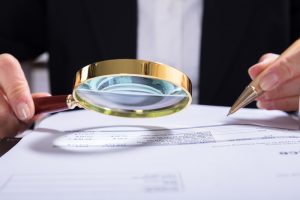To ensure that Canadian businesses are following the tax laws, the CRA undertakes business audits. Though hearing your company will be audited may make you sweat, if you’re prepared, an audit need not engender fear. The best way to deal with an audit request is to understand the process and to provide the information to the auditor in a timely manner.
What is a tax audit: A tax audit is a detailed examination of a business’ books and records by the Canadian Revenue Agency (CRA) to confirm whether that business is fulfilling its tax obligations (income tax, deductions, employee benefits, payroll remittances, GST/HST), following tax laws and receiving the benefits and refunds they are entitled to. It’s conducted after the business has received a notice of assessment and is intended to check that their records support their tax return. Audits are meant to ensure that the Canadian tax is fair for all and maintain confidence in the integrity of Canada’s tax system.
What are the most common issues that prompt a business audit?
The CRA will consider an audit if they discover:
- Multiple or repeated errors on your tax returns
- Major changes in income or expenses
- Repeated losses
- Expenses not in line with others in your industry
- Under-reported earnings
- Overly large charitable donations
- Unsubstantiated home office deductions
- Discrepancies between GST returns and Tax returns
- Shareholder loans that should be considered income
- Missing information
- Audit of a related party
- A lifestyle incongruent with your declared income
- Real estate transactions
- Vehicle expenses
- Informant tips
What is the procedure for a business audit?
A CRA auditor contacts a business by mail or phone and sets a date, time and location for the audit. A review may be held at your place of business, your representative’s/accountant’s office or at a CRA office. You’ll receive the agent’s contact information and be informed of the scope of the audit. You’ll be asked to provide supporting documents for the review. The auditor may make copies of your records and/or borrow some of your documents. The agent will discuss with you any questions that arise during the audit and address your concerns.
What documents are required for a business audit?
The documents requested may include:
- Business records (ledgers, journals, invoices, receipts, contracts, rental records, bank statements)
- Personal records (bank statements, mortgage documents, credit card statements)
- Records of other individuals related to the business (spouse, family members, corporations, partnerships, trusts)
- Records from your accountant that relate to the books, records and tax returns of your business
How can a business prepare for an audit?
There are a number of steps your business can take to retain readiness for an audit and/or to prepare once an audit notice is received.
- Keep accurate, detailed records: Well-kept records (business records, personal records, accountant’s records, records of individuals related to the business, minutes of meetings, organizational documents, transfers and deposits for bank/investment/credit card accounts) ease the process of an audit. Review your documents several times and work with an experienced business accountant. Be thorough. Accurate, detailed records are your best tool for surviving audit procedures.
- Consider automated solutions: Expense-tracking apps serve as a record of transactions in case of an audit. Choose one that easily syncs with your accounting software. It saves time and makes for easy management.
- Aim for consistency: The CRA values overall consistency in business tax returns. Your company’s return must be consistent with those of others in your industry. Abnormal income, compared to your peers and competitors, may cause additional scrutiny. Discrepancies between sales and the total reported on line 101 of your GST/HST return may also result in an audit.
- Know the red flags: Become informed regarding the details that make a business prone to audit requests. Speak with your accountant about these indicators and how to navigate them.
- Keep abreast of accounting standards: Accounting standards constantly change. Familiarize yourself with accounting developments that may affect your organization and the way you track data and/or operate.
- Reconcile all accounts: If your business receives a notice of audit, pay all bills, remit employee expense claims and collect all invoices. Resolve administrative issues. This enables accurate projections and analysis during an audit.
- Identify significant changes such as current projects, recent investments, new revenue streams, recent grants/government support received, changes in control systems and/or new processes introduced. This helps you prepare for the review.
- Divide responsibilities: Break down the tasks required for audit preparation and assign them to competent employees. Set appropriate deadlines for the completion of the assignments. This makes the audit process manageable.
- Ask questions: Once an audit notice is received, create clarity by asking the auditor for details regarding requirements. Be clear on when documentation is required. Transparency between your business and the auditor makes audit preparation and completion faster and easier.
- Seek the help of a professional: If your business receives an audit notice, contact your CPA and arrange representation during the audit. Request assistance preparing the documents required.
- Create ease for the auditor: Set up a quiet, comfortable workspace for the auditor and have all documents organized. Make it easy for the auditor to move quickly through your materials.
- Know your rights: If you disagree with the CRA’s assessment, contact the auditor, explain your concerns and provide documents to support your position. If you’re not able to resolve the disagreement, you have the right to appeal. Your CPA can help with this process.
Filing taxes for a business is a complicated procedure. A Chartered Professional Accountant will ensure your tax return is complete and accurate, reduce the chances of your file being chosen for an audit and ensure you’re rewarded the deductions you’re entitled to. Should your business receive an audit notice, your CPA will support you through the process, ensuring it transpires as smoothly and quickly as possible.
For all your tax needs contact Cook and Company Accountants. Whether you operate a sole proprietorship or a sizable corporation with multiple subsidiaries, Cook and Company use their experience and expertise to make tax time a breeze. We will assist in dealing with the CRA in the event of an audit. Contact us for a complimentary consultation.





